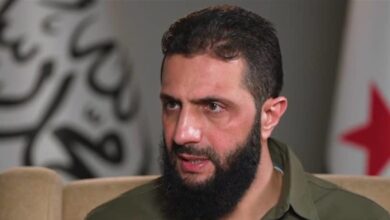Israel faces a strategic realignment in Syria
The American newspaper “Newsweek” wrote that “Israel is now dealing with the Syrian problem.” For many years, officials in Jerusalem have relied on a relatively predictable balance of power with the neighboring regime of Bashar al-Assad in Damascus. Despite Assad’s ongoing hostility toward the Jewish state and the inherent weakness of his regime, a fragile status quo has been reached between the two countries, making it generally predictable how the Syrian president will act. “This has continued over the past fourteen months, as Israel has found itself preoccupied with the threat posed by Hamas in the Gaza Strip and, more recently, by Hezbollah in Lebanon.”
According to the newspaper, “This is no longer the case.” The rapid collapse of the Assad regime in December in the face of renewed internal opposition demolished the old status quo in the Levant. The world has witnessed the rise of a diverse coalition of extremist groups dominated by the former Al-Qaeda organization, Hay’at Tahrir al-Sham, and its leader, Abu Muhammad al-Julani, or Ahmed al-Sharaa. At first glance, this new system may seem beneficial to Israel. After all, Assad’s ouster helped displace a previously strong Iranian presence on Israel’s northern border, which entailed dozens of military bases and thousands of deployed foreign fighters. Thousands of Iranian civilians have already fled Syria, while Iran has had to rely on Russia to move its military forces to safety. “Also important is the fact that the ‘land bridge’ between Tehran and Beirut, which the Iranian regime has used for years to supply weapons to Hezbollah in Lebanon, has now been effectively cut off.”
The newspaper continued, “But closer examination indicates that the transformation in Syria represents a profound strategic challenge for Israel, a challenge that the Jewish state is now striving to address.” Retired Brigadier General Eran Ortal, who previously headed the Israeli Military Research Center and now works as a senior analyst at the Beijing-Sadat Center for Strategic Studies at Bar-Ilan University, recently told the newspaper: “At this stage, I do not think that Israel has developed a coherent strategy in dealing with Syria.” . Instead, “Israel is closely monitoring the situation and taking the necessary measures to secure itself, such as deploying Israeli army units on the Syrian Golan Heights.”
The newspaper added, “But the picture in Syria after Assad poses a challenge to the Israeli government, which has spent the past decade focusing almost exclusively on the threat emanating from Shiite Iran and its various proxies.” Ortal noted that “the speed and enthusiasm of the embrace of Al-Julani and his partners in Al-Qaeda is a source of concern,” because “Al-Julani and his coalition of rebels are known to be jihadists, and Israel has just woken up from the dream of being able to appease a jihadi regime, the Hamas regime in Gaza.” In other words, regardless of Al-Julani’s current conciliatory rhetoric, Israel fully expects that he and his comrades will return to their extremist mode, perhaps sooner rather than later.”
According to the newspaper, “But this is not the most troubling part of the new strategic dynamic taking shape to the north of Israel. “No one knows Turkey’s possible role on our borders,” Ortal explains. It is a major regional power, a NATO member, a major defense manufacturer, and an anti-Israel extremist player. “We can already see Turkish President Recep Tayyip Erdogan’s attempts to use the new Syrian regime to strengthen his claims in the eastern Mediterranean.” What might all this mean? “Ultimately, the bigger picture is that regional competition is entering a new phase,” Ortal says. “Our region is returning to imperialist competition, and Israel is stuck in the middle.”
According to the newspaper, “The same applies to Washington, as the Joe Biden administration’s response to the overthrow of Assad was quick, and largely uncritical, in dealing with Al-Julani. This necessitated, among other things, a rollback of sanctions imposed on the de facto new broker of power in Syria. Such steps are supposed to aim to build trust with the new powers based in Damascus, and allow the United States, after years of withdrawal, to leave a more favorable footprint in the country. What it will not do, however, is protect America’s interests in the broader region. This will be the task of the incoming Donald Trump administration, which will need to determine what role it wants to play in the new strategic game now underway in the Middle East, and how it can best support regional allies, such as Israel, who are beginning to feel its effects.
Source:
Translation of “Lebanon 24”






